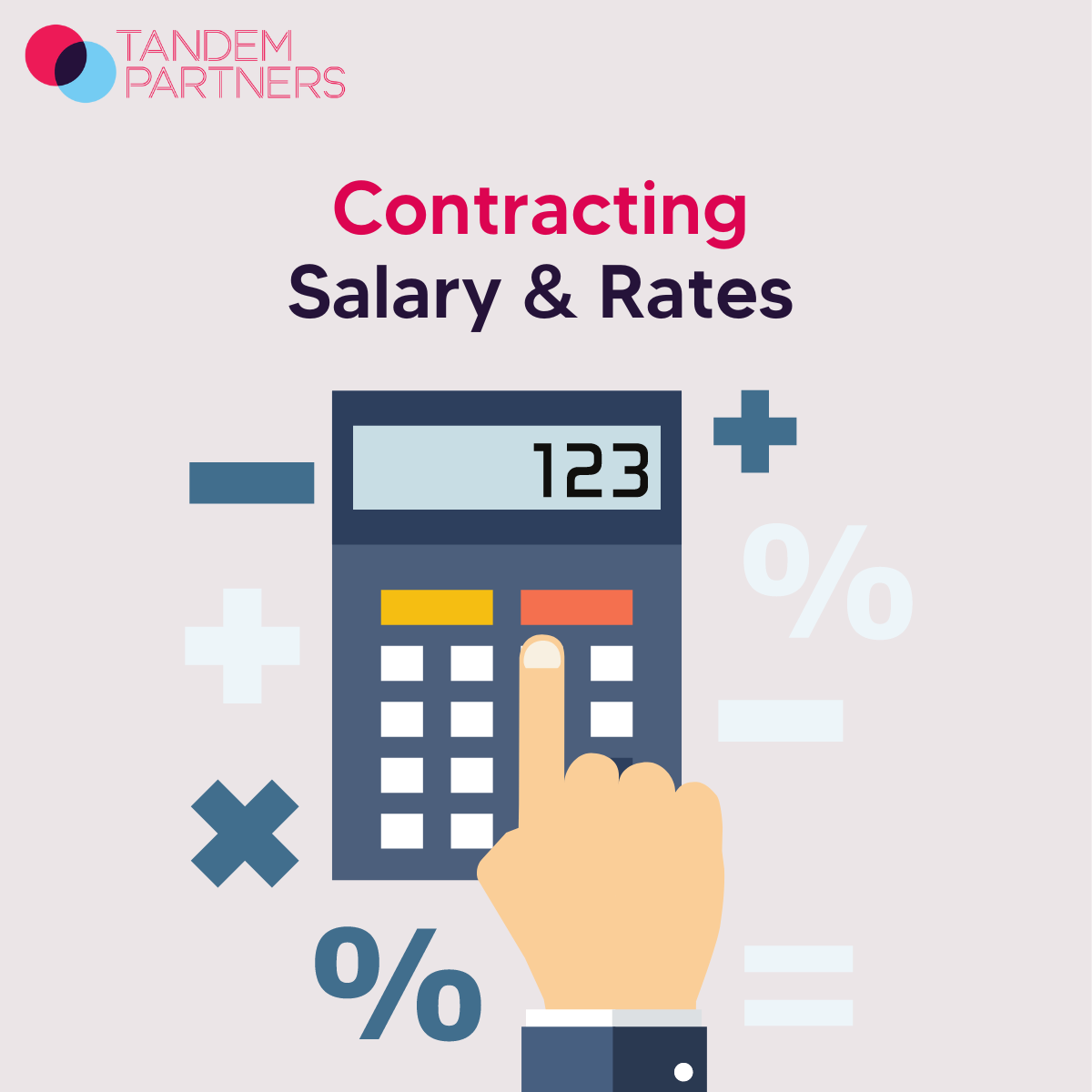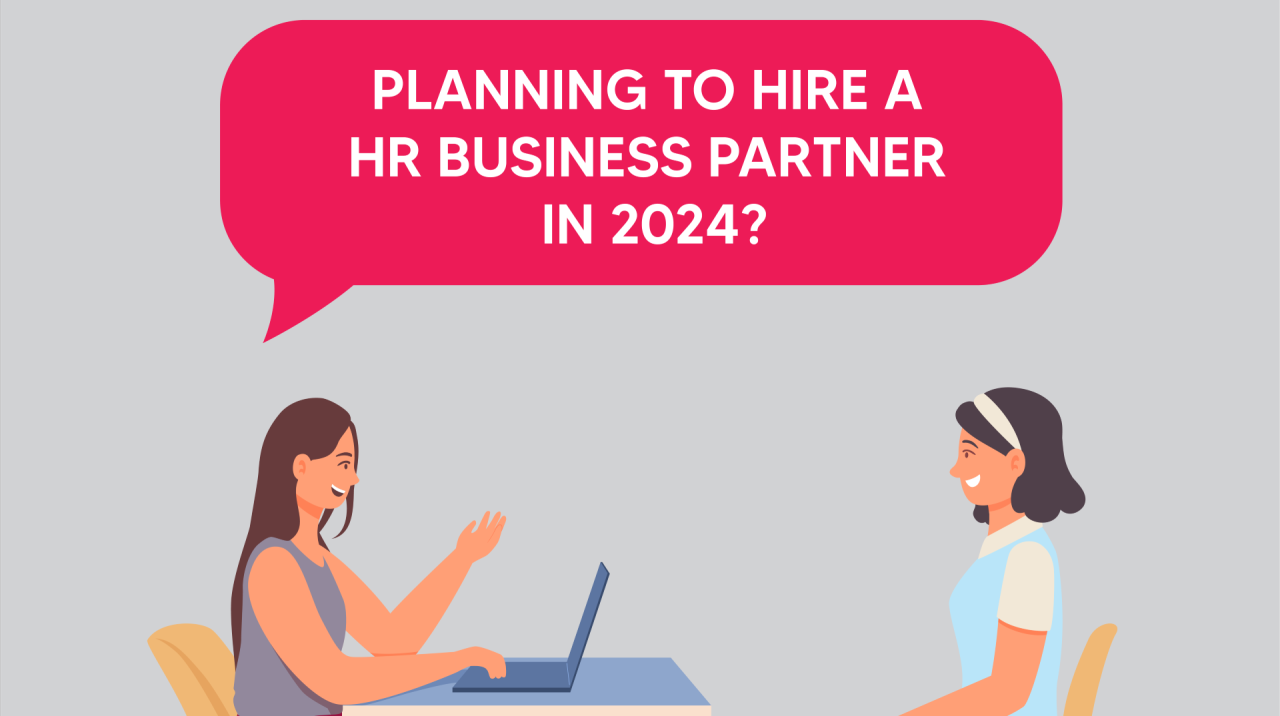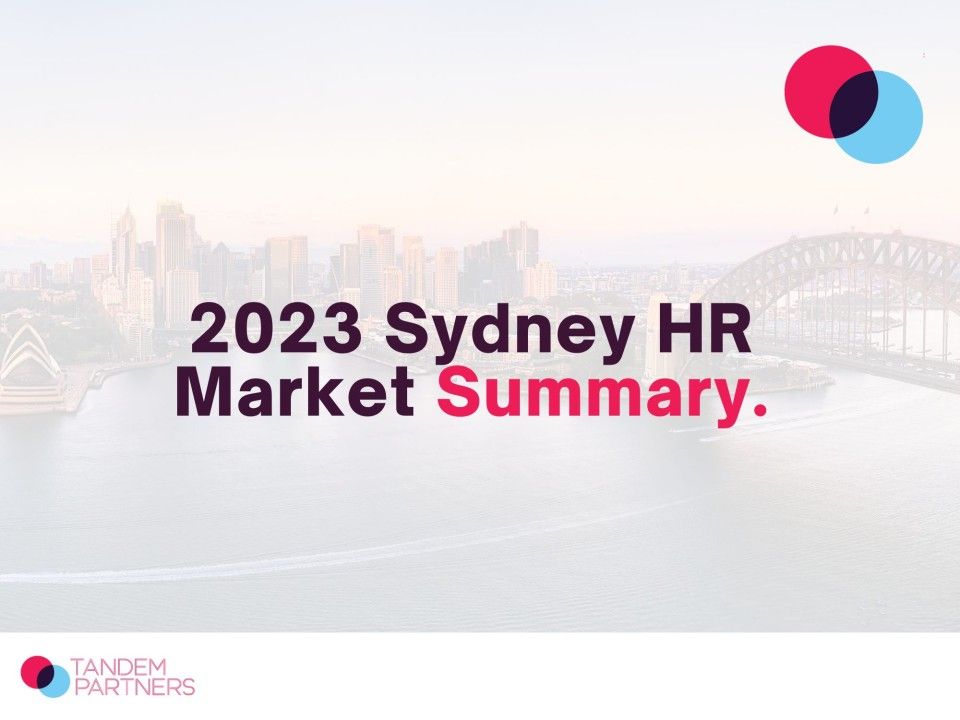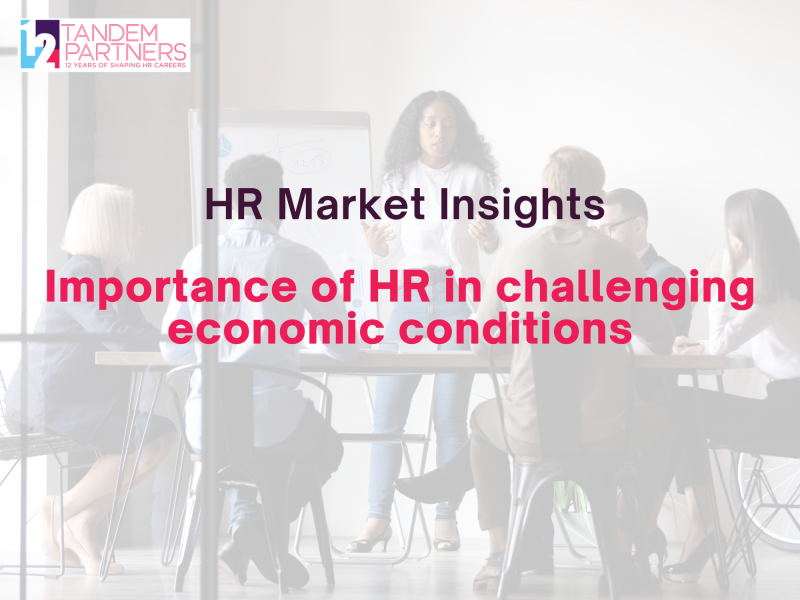Tandem News.

By Georgia Hazell
•
07 Mar, 2024
I was recently fortunate to meet with several exceptional senior HR practitioners who in the course of our conversation, demonstrated a high level of commercial understanding of their organisation and how their roles were able to impact the business. It made me think about how commercial acumen is a very desirable trait in an HR professional at all levels. You see it in nearly every job description and on job ads but what exactly is it? How do you develop it as an HR Business Partner? And how can you demonstrate it when looking for a new role or promotion? Business acumen for HR is much broader than just understanding how an organisation makes money, who its competitors are, and how to read a P&L (although that’s a solid start). It involves being able to analyse data and provide insights, the ability to develop and present a business case. Business acumen is a combination of commercial knowledge, skills, and experience that enables someone to understand key business issues, apply that understanding effectively, make informed decisions, and influence leaders quickly. The HR practitioners I met with recently had taken the opportunity to step out of their senior HR roles for a period of time to manage a business unit or function in large complex businesses. Opportunities afforded to them because of the relationships and trust they had built with executives in those businesses over time. By being open to the opportunity, although at times a steep learning curve, they have come back into HR roles with an even deeper level of commercial understanding that they have then used to drive HR strategy and demonstrate HR’s importance to the business. Is it possible to develop commercial acumen without stepping into a different role? Absolutely! Getting involved in projects with cross-functional teams where you are working with different parts of the business is a great way to develop relationships and your understanding of the business. Asking and being inquisitive with leaders further about their role and function. Project management can also build key skills in budgeting and financial literacy, communication skills, reporting, and delivery. If you are just stepping into a HR Advisor or HR Business Partner role an important way you can build your business knowledge may be to be as visible as possible, especially initially. This may mean being in the office as often as possible, being contactable to your key stakeholders, hearing their conversations, and immersing yourself in the business. Being visible and learning the language and rhythms of the business will go a long way to building the trust and understanding you will need to progress in your role. Study, read, go to industry events, and look for opportunities to partner with different parts of the business. How do you demonstrate your commercial understanding on your CV or in an interview, especially earlier on in your career? On your CV it is important to highlight details of the business and business unit you support - how big are they? What do they do? Who are your key stakeholders? Can you articulate your impact on the revenue line and/or bottom line? How did you make a difference? By showcasing your commercial acumen, at any stage of your career you not only position yourself as a partner to the business but also as someone who understands the critical link between HR practices and overall business success.

By Shazamme System User
•
29 Feb, 2024
As I celebrate five years with Tandem Partners Pty Ltd. today, I've been reflecting on this article I wrote, six months into the most drastic career change I'd ever made. Four and a half years later...still here! Testament to the fabulous humans I'm lucky enough to call my team, fascinating conversations every single day with HR clients and candidates, and continual learnings along the way. In the realm of professional (and personal) growth, sometimes we confront the decision to embark on a new path, to dare to make a career change that aligns more closely with our passions, values, needs, or aspirations. It really is a leap of faith - one that requires courage, self-reflection, and a willingness to embrace the unknown. Within the uncertainty lies the potential for profound transformation. Transitioning careers can be daunting; it challenges us to step outside our comfort zones, to redefine our identities, and to confront the fear of failure. However, it is precisely in these moments of uncertainty that we have the opportunity to discover our true capabilities and pursue paths that resonate with our authentic selves. The decision to change careers can arise from a desire for greater fulfilment, purpose, and meaning in our lives. Whether it's a long-held passion, unfulfilled ambitions, or shifts in personal circumstances or industry trends, embracing change requires a mindset of adaptability, resilience, and openness to learning. One of the most valuable lessons you can learn on your career trajectory is the importance of introspection and self-discovery. Pausing and taking the time to reflect on our strengths, interests, and values can provide invaluable insights into the direction we wish to pursue. Whether through self-assessment tools, mentorship, or meaningful conversations with peers and mentors, clarifying our professional aspirations can serve as a guiding light as we navigate our careers. Making a career change is not merely about finding a new job or title - it involves acquiring new skills, expanding our networks, and embracing the opportunities and challenges that come with venturing into uncharted territory. You need to cultivate a growth mindset, one that thrives on curiosity, resilience, and a willingness to learn from both successes and setbacks. In the face of uncertainty, it's natural to experience moments of doubt, apprehension, even trepidation. Surrounding ourselves with a supportive community of peers, mentors, and allies can provide encouragement, guidance, and perspective as we navigate the highs and lows. Embrace change, trust in your abilities, jump into the unknown, and pursue paths that challenge and inspire you. Check out this advice on planning a change , as a starting point, if you're thinking about a change in role type, company, industry, or a complete career flip. Have you taken a leap of faith? How did it go? What did you learn? #careerchange #LinkedIndiscussion #tandempartners

By Matthew Saitta
•
07 Feb, 2024
Salary & and rates when working on assignments aren’t everything, but it’s important. This article is a foundational guide for those considering contracting or interim employment, but perhaps have never done it before. Converting Annualised Salary into Day/Hourly Rates Although it’s a lot easier to compare a prorated fixed/max term salary to see the annualised salary equivalent, it’s not as easy, nor a fixed rule when it comes to converting annual salary to a day rate, as they are different employment arrangements. There is a general calculation as a rough guide that can help as a starting point. To get an initial estimate of a day/hourly rate from an annualised salary, you can use a simple calculation by dividing the per annum salary by 220 working days, which would give you a fair market equivalent. The 220 days are calculated by starting with total days in the calendar year = 365 days then minus 55 weekends, approx. 10 public holidays, 20 days annual leave, and 10 days personal leave which leaves 220 days (approx.). Here’s an example below: Positions around $150,000 p.a. including super, and considering day rate contracts, then: $150,000 including super divided by 220 days = $681.81 per day including super. The hourly rate would then be $681.81 divided by 7.6 hours = $89.71 per hour including super. Bonuses Some of the obvious differences that you need to consider when applying for contracting and interim work is, given you aren’t a full-time permanent salaried employee, a lot of the time you aren’t on the company’s annual benefit scheme so aren’t entitled to the annual bonus and company benefits. However, some contracts do pay a completion bonus, and some of the time you can negotiate this as part of your package. Completion bonuses are on average between 5 to 20%, with some industries paying more depending on the length of the assignment and seniority of the position. Completion bonuses can be variably calculated with links to performance objectives and/or company performance, or they are fixed. Fixed is designed to ensure candidates complete the contract to date, although even fixed completion bonuses can have clauses in a contract around performance measures, however, this is more a risk management policy protecting companies requiring paying contractors for serious underperformance of the contractor in the term of the contract, rather than variable bonuses which are designed for rewarding measures of performance and completing objectives. If the completion bonus is variable, a good question to ask is if the bonus can pay out more than 100% of the target, especially where the business has a chance for strong financial returns, or if the culture is one that financially rewards high performance. Working through an ABN If you're planning an extended career in contracting, consulting, and interim work, you may want to consider setting up an ABN (Australian Business Number) or even a Pty Ltd (proprietary limited) business, as that can provide benefits not possible if you are an employee. Ensure you gain the necessary financial advice to ensure the contract work is eligible and compliant with tax legislation, and you are covered with the necessary insurance requirements. If choosing this option, you need to factor in the time and effort to independently manage your business administration, invoicing, and taxes. You may want to consider the convenience of outsourcing to a ‘contractor management’ company that can easily cover your insurance and handle all the invoicing, tax, and accounting services that independent contractors require, with a management fee. If you are using an ABN on an interim assignment through an agency, they will ensure you have the necessary insurance and are tax compliant, however, most agencies also have the option to cover you on their insurance if you don’t have them without changing the agreed rate offered before receiving your contract. This is a good discussion to have before proceeding with the recruitment process for an assignment through an agent. Negotiation & the Finer Detail Where possible, ensure you understand the budget for the assignment and rate on offer early in the process before investing too much of your time in interviewing, and not leaving negotiating too late in the process if you want to discuss a higher rate than what’s been proposed. This isn’t always possible to do until offer, but most of the time salary and rate can be found out early in the application process. A degree of flexibility with your salary and rate expectations can minimise outpricing yourself in the market, missing an assignment due to budget constraints, and missing out on getting the offer to a competitive candidate with the same skills and experience who are more flexible. Ensure all the details are correct if any figures are provided in the recruitment process, including is the rate proposed is inclusive or exclusive of superannuation; details of any bonuses if any; perhaps how is salary packaging offered if you are working within a Not-for-Profit that may offer tax exemptions. Details around notice periods and expenses, like travel between sites, etc. are also necessary to cover, as in certain situations, they may impact you financially. The Bigger Picture Salary and rates aside, the bigger picture is that contracting and interim work can accelerate your career at any stage, including those in the early stages of their emerging career who want development opportunities to learn, through to those that are at the executive and leadership level, who are seeking interesting, high-impact work and a chance to utilise and apply their extensive experience. If you are a HR generalist or specialist professional in Sydney and have any questions or are interested in contracting, or contracting salary or rates, then please don’t hesitate to reach out, or re-contact us if it’s been some time and would like to update us on your availability, experience & circumstances.

By Rachel Gilzean
•
05 Feb, 2024
We have certainly experienced a change in the Sydney employment market over the last twelve months. With rising interest rates impacting businesses and consumers, the job market has slowed down considerably. This time last year, candidates were receiving multiple job offers and hiring decisions were being made relatively quickly to able to secure talent. In the last six to twelve months, there has been less choice of roles, and candidates now need to be more proactive to ensure that they are being considered for opportunities. Equally, organisations are being more cautious in their decision making with hiring processes being pushed out for extended time periods. Organisations are being mindful of their own HR and business budgets and are now less likely to stretch their salaries for the right candidate. Whilst there are less roles available, it is still a talent short market for top-talent, and businesses are holding out for their ‘unicorn’ candidate. Hiring managers are also increasingly scrutinising candidates’ tenure in previous companies to assess the likeliness of candidates’ long-term commitment to an organisation, as they work towards stabilising their teams after turnover and much change over the past few years. Passive candidates are being extra cautious due to economic uncertainty and are less likely to jump into a new role quickly in the same way they were in 2021 and 2022. Many candidates we are speaking with have also regretted moving to new roles over the past couple of years and will move only if the leadership and culture is strong, but more so if the company is stable and growing. MOST IN DEMAND HR TALENT HR Business Partners : A lot of organisations are struggling to attract the right calibre of HR Business Partners, particularly those sitting within the $130,000 - $150,0000 base salary mark. HRBP’S that can demonstrate strong commercial acumen and stakeholder management skills at interview are doing very well during their job searches. Remuneration & Reward: Specialists who are able influence senior stakeholders have remained in high demand this year. Remuneration and Reward Partners with ASX-listed, Financial Services and Governance experience have been especially difficult to attract. HR Advisors: At the Junior to mid-level market, the most in demand role have been HR Advisors. HR Leaders are struggling to attract experienced Advisors with a good level of employee relations experience, often due to the need to pay a premium for top talent. Many high performing HR Advisors are focused on moving into HRBP roles for their next role and are now willing to wait until they find a step up in their next role. IR Specialists: As the industrial relations landscape continues to change, experienced and contemporary Industrial Relations Specialists remain in high demand, particularly those with proven experience effectively partnering with unions and end to end EBA negotiation experience. COMPETITVE ROLES FOR CANDIDATES Executive HR Roles: It is most competitive for roles at the senior to executive level. Opportunities that do arise however are less consistent. Most vacant roles at this level are replacement roles rather than newly established opportunities. Talent Acquisition: We have seen an influx of Talent Acquisition candidates in the market at all levels due to hiring freezes, headcount reductions and overall economic uncertainty. With some excellent Recruiters on the market right now, we view it as a great time to bring forward their hiring of these roles now. Organisational Development: There has been less movement within the Organisational Development space, particularly at the Partner/Senior Consultant level. That being said, open roles with a strong focus on Talent and Leadership Development has remained steady due to many organisations being focused on building their capability internally. WHAT TO EXPECT IN 2024 Overall, due to the significant movement in the HR market in 2021 and 2022, coupled with budgetary headcount restrictions, we are predicting that in early 2024 HR roles will continue to become more specific and aligned to the business. As People and Culture teams continue to be more under resourced than ever, recruiting highly qualified and experienced practitioners to solve their current ongoing people and business challenges are top of mind for hiring managers. As interest rates in the short term appear to remain flat, as an eternal optimist, we are predicting positivity in the market and hopefully an upswing of opportunities in 2024. Whilst recent years have taught us to be cautious with market predictions, industries where we see the most growth in the next year include Education, as well as Healthcare and Aged Care. With many HR Professionals already commencing their job searches this side of the festive season, we’re predicting a good amount of movement in the market in February 2024.

By Rachel Gilzean
•
05 Feb, 2024
We have certainly experienced a change in the Sydney employment market over the last twelve months. With rising interest rates impacting businesses and consumers, the job market has slowed down considerably. This time last year, candidates were receiving multiple job offers and hiring decisions were being made relatively quickly to able to secure talent. In the last six to twelve months, there has been less choice of roles, and candidates now need to be more proactive to ensure that they are being considered for opportunities. Equally, organisations are being more cautious in their decision making with hiring processes being pushed out for extended time periods. Organisations are being mindful of their own HR and business budgets and are now less likely to stretch their salaries for the right candidate. Whilst there are less roles available, it is still a talent short market for top-talent, and businesses are holding out for their ‘unicorn’ candidate. Hiring managers are also increasingly scrutinising candidates’ tenure in previous companies to assess the likeliness of candidates’ long-term commitment to an organisation, as they work towards stabilising their teams after turnover and much change over the past few years. Passive candidates are being extra cautious due to economic uncertainty and are less likely to jump into a new role quickly in the same way they were in 2021 and 2022. Many candidates we are speaking with have also regretted moving to new roles over the past couple of years and will move only if the leadership and culture is strong, but more so if the company is stable and growing. MOST IN DEMAND HR TALENT HR Business Partners : A lot of organisations are struggling to attract the right calibre of HR Business Partners, particularly those sitting within the $130,000 - $150,0000 base salary mark. HRBP’S that can demonstrate strong commercial acumen and stakeholder management skills at interview are doing very well during their job searches. Remuneration & Reward: Specialists who are able influence senior stakeholders have remained in high demand this year. Remuneration and Reward Partners with ASX-listed, Financial Services and Governance experience have been especially difficult to attract. HR Advisors: At the Junior to mid-level market, the most in demand role have been HR Advisors. HR Leaders are struggling to attract experienced Advisors with a good level of employee relations experience, often due to the need to pay a premium for top talent. Many high performing HR Advisors are focused on moving into HRBP roles for their next role and are now willing to wait until they find a step up in their next role. IR Specialists: As the industrial relations landscape continues to change, experienced and contemporary Industrial Relations Specialists remain in high demand, particularly those with proven experience effectively partnering with unions and end to end EBA negotiation experience. COMPETITVE ROLES FOR CANDIDATES Executive HR Roles: It is most competitive for roles at the senior to executive level. Opportunities that do arise however are less consistent. Most vacant roles at this level are replacement roles rather than newly established opportunities. Talent Acquisition: We have seen an influx of Talent Acquisition candidates in the market at all levels due to hiring freezes, headcount reductions and overall economic uncertainty. With some excellent Recruiters on the market right now, we view it as a great time to bring forward their hiring of these roles now. Organisational Development: There has been less movement within the Organisational Development space, particularly at the Partner/Senior Consultant level. That being said, open roles with a strong focus on Talent and Leadership Development has remained steady due to many organisations being focused on building their capability internally. WHAT TO EXPECT IN 2024 Overall, due to the significant movement in the HR market in 2021 and 2022, coupled with budgetary headcount restrictions, we are predicting that in early 2024 HR roles will continue to become more specific and aligned to the business. As People and Culture teams continue to be more under resourced than ever, recruiting highly qualified and experienced practitioners to solve their current ongoing people and business challenges are top of mind for hiring managers. As interest rates in the short term appear to remain flat, as an eternal optimist, we are predicting positivity in the market and hopefully an upswing of opportunities in 2024. Whilst recent years have taught us to be cautious with market predictions, industries where we see the most growth in the next year include Education, as well as Healthcare and Aged Care. With many HR Professionals already commencing their job searches this side of the festive season, we’re predicting a good amount of movement in the market in February 2024.
Tandem Partners acknowledges the Traditional Custodians of the land on which we live and work. We recognise their continuing connection to land, water and community and pay respect to Elders past, present and emerging.
Site Configuration
:::

Upload
Cancel
Select an icon




